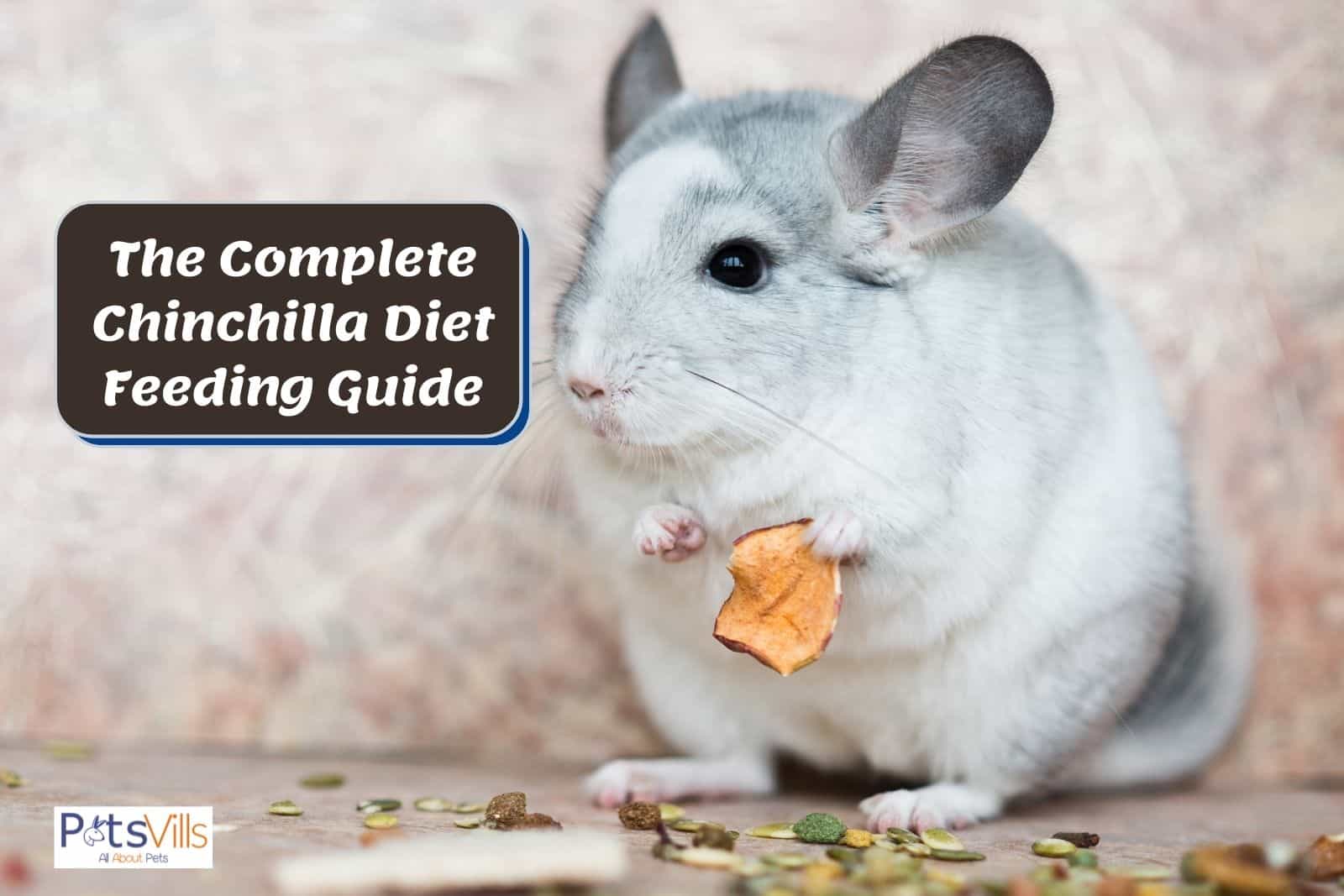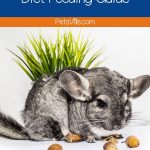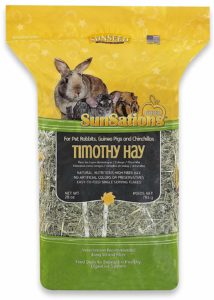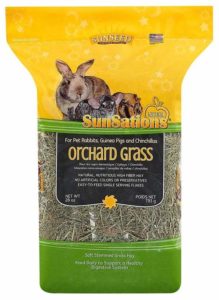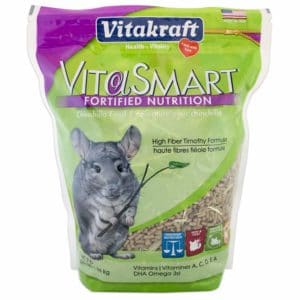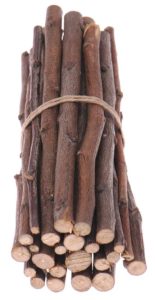Chinchillas are herbivorous. Their diet consists of foods with high protein and fibers. It’s extremely important to feed your chinchilla the correct diet, otherwise, they may start developing health problems.
In this article, we will cover what foods you should and shouldn’t feed your chinchillas and other food-related questions.
FYI, this post contains affiliate links. We earn a commission if you make a purchase at no extra cost to you.
Table of Contents
What Food Should I Feed My Pet Chinchilla?
When feeding your chinchilla it’s important to feed your chinchilla the correct diet. Chinchillas that have a poor diet are prone to health problems, such as overgrown teeth.
You should give your pet chinchilla a constant supply of timothy hay with 1-2 tablespoons of grass-based pellets daily.
Consider buying a hay rack for your chinchilla if you haven’t already, this prevents your chinchilla from eating dirty hay that they may have urinated or pooped on.
Timothy Hay is the most popular type of Hay that chinchilla owners like to feed their chinchillas. There’s a range of all different types of hay that have different uses.
You should always make sure your chinchilla has a constant supply of water in a water bottle. Fill up and check the bottle regularly to make sure that water is still dripping out.
What Type of Hay Do Chinchillas Eat?
Chinchillas can consume a variety of hay.
The most popular hay for pet chinchillas is Timothy hay, which comes in three different cuts.
The first cut is coarse-stemmed and has many heads. The second cut is a mixture of green hay and is very soft, while the third cut is smooth and leafy making it an ideal choice for fussy chinchillas.
Alfalfa hay is also a good choice as it contains plenty of nutrients.
Alfalfa hay is best for young and malnourished chinchillas.
Adult chinchillas should consume alfalfa hay occasionally, as the high level of oxalates may lead to the development of urinary complications. Alfalfa hay is bright green and has a pleasant fresh smell.
If you can’t find Timothy hay, the best alternative is the orchard grass, which has a high fiber content.
Orchard grass is bright green and is often mixed with the likes of alfalfa and garrison.
Chinchillas also love oat hay, pale yellow hay, contains oat heads, and is quite robust.
However, it would be best if you fed your chinchillas oat hay occasionally. Other hays to consider are bluegrass hay and botanical hay.
Never buy any hay with a mixture containing oils or vegetables.
What Type of Pellets is Suitable for My Chinchilla?
Chinchillas live on a simple diet comprising of the best chinchilla hay and a small amount of 1-2 tablespoons of high-quality grass-based pellets.
You can find quality chinchilla pellets on the market.
When switching their grass-based pellets, you should switch pellets gradually. Otherwise, you can upset your chinchilla’s stomach.
Mix 75 percent of the old pellet with 25 percent of the new pellet in the first week.
This serves to introduce the animal to the new food.
Make the ratio 1:1 for the second week of switching.
During the third week, the pellets with the ratio, 25 percent old pellet to 75 percent new pellet.
On the fourth week, serve your chinchillas with only the new pellets, and you would have made a successful switch.
What Foods Should I Not Feed My Pet Chinchilla?
Feeding your chinchilla too many grass-based pellets will not provide adequate fiber.
Only offer your chinchillas small amounts of dried fruits, or root vegetables as treats. Giving them too many treats won’t provide the nutritional diet that they need and can use dental diseases and other illnesses.
Don’t feed your chinchillas nuts and seeds as they are very high in fat, and your chinchilla doesn’t need them.
If you overfeed them treats you they can become, ill, overweight, or get dental diseases such as overgrown teeth.
What Treats Can I Feed My Chinchilla?
Chinchillas can eat carrots, raisins, and sultanas as treats but only in very small amounts!
Apple chew sticks are a great treat for your chinchilla as it helps trim your chinchilla’s teeth.
You don’t really need to give too many treats to your chinchilla and doing it too often can make them ill.
Don’t give your chinchillas nuts or seeds as treats as the fat content is too high.
Be cautious of the number of treats you feed your chinchillas. Chinchillas have delicate stomachs, and an excess of fruits and vegetables may result in diarrhea.
Most treats contain a high amount of fat and sugar, contents that could lead to chinchillas gaining weight or having damaged livers.
Check other chinchilla snacks for your pet.
Can Chinchillas Eat Apples?
Chinchillas can eat apples in small amounts and not too often.
Carrots are quite nutritious for chinchillas’ bodies and are great for their teeth.
Moderation is the key when feeding your chinchilla apples. Make sure they are cut into small pieces and easy for your chinchilla to chew.
Feeding your chinchilla too many carrots can them ill and isn’t good for their health.
Can Chinchillas Eat Grapes?
Grapes should be avoided as they contain too much water and can give your chinchilla diarrhea.
When feeding treats to your chinchilla you should only really give them dry fruits.
Can Chinchillas Eat Raisins?
Chinchillas can eat raisins but in moderation.
Overfeeding your chinchilla raisins or any fruits as treats can make them ill.
Can Chinchillas Eat Carrots?
Chinchillas can eat carrots but make sure they are chopped up into smaller pieces.
Carrots are good for your chinchilla’s teeth and should be given to your chinchilla in moderation.
Overfeeding them too many treats can make them ill and isn’t good for their health.
Can Chinchillas Eat Rabbit Food?
Chinchillas cannot consume food meant for rabbits, as the two animals have different dietary requirements. It is better not to give rabbit food pellets to your chinchillas.
Some experts claim quality rabbit food is great. The biggest problem is they have not imposed on the level of quality the food should be, and it is also quite difficult to find rabbit food that is of the highest quality.
Make sure that any food you give your pet is labeled safe for them to eat.
Can Chinchillas Eat Guinea Pig Food
So, can a chinchilla eat guinea pig food too? Chinchillas cannot consume food meant for guinea pigs, as the two animals have different dietary requirements. It is better not to give rabbit food pellets to your chinchillas.
What Do Chinchillas Eat in the Wild?
WARNING: Do not feed your chinchilla foods that wild chinchillas might eat. Chinchillas’ diet is quite different and can result in making your pet seriously ill.
In the wild, chinchillas eat the bark off trees to obtain fiber, which is essential in the diet.
The low fiber in the body may jeopardize digestion, as well as, making the chinchillas’ teeth overgrow, a situation that may lead to the rodents chewing on their fur.
In the wild, a chinchilla consumes fruits, small plants, seeds, plant leaves, and small insects.
Nevertheless, the chinchilla eats a large variety of vegetation except for plants that are too lush, as they tend to upset the chinchilla’s stomach.
Chinchilla’s Diet-Related Health Problems

Chinchilla’s teeth are always growing, and when they do not receive the correct diet they need, the upper and lower teeth can grow so much that they collide when chewing, impacting the roots and causing lots of pain to the chinchilla.
Other symptoms are drooling eye discharge, and pressure on the chinchilla’s tear ducts.
If you notice that your chinchilla’s teeth are getting longer, make sure you’re providing them with the correct diet. You can also buy chew toys that help shorten the length of your chinchilla’s teeth.
If you feed too many pellets, you risk getting your chinchilla overweight, and may also get diarrhea and obesity due to ingestion of a high amount of carbohydrate.
An excess of fresh greens may lead to diarrhea and soft stool.
Your chinchillas may also develop calcium-based bladder stones due to the consumption of high amounts of calcium-made alfalfa hay.
To avoid such complications, stick to Timothy hay or at least find a low-calcium option such as an orchard or meadow grass.
Did you know that chinchillas don’t vomit?
Small or hard foods such as raisins, nuts, dried fruit, or seeds may be embedded on the throat or esophagus, resulting in salivation, gagging, loss of appetite, and development of breathing complications.
Chinchillas may also consume indigestible bedding like wood shavings, which can lead to complications.
Take your chinchillas to a vet when they display any of these signs. The vet will perform an examination and provide possible treatment.
What Fruits and Vegetables Can I feed My Chinchilla?
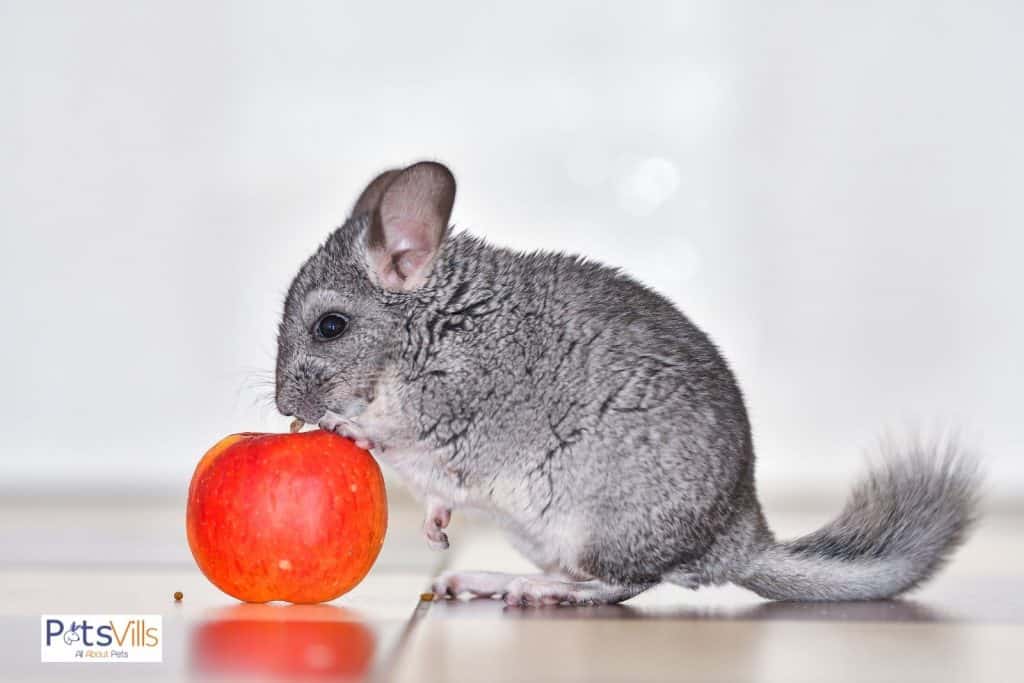
Both dry and unprocessed fruits and vegetables contain a lot of natural sugar.
Chinchillas do not do well with excess sugar, which can induce diseases to your pet rodent.
A sugary diet causes conditions such as diabetes, hypoglycemia, and hyperglycemia.
Many chinchilla owners do not know that a shrunken fruit is the same as a dry fruit. When you dry or shrink a fruit, the sugar content does not reduce; it remains the same.
Fruits and veggies also consist of moisture. In their natural state, the moisture is at the right level for chinchillas.
Since chinchillas come from dry regions, they are accustomed to consuming dry food.
Make sure that there is less moisture in the pet’s diet since an excess of it may cause bloating, which can be dangerous to chinchillas.
Chinchillas don’t know how to release gasses, and a build-up can lead to the animal’s death unless action is taken to counter the bloating.
Nuts and seeds have high-fat content.
Consumption of foods with high amounts of fat may make your chinchilla vulnerable to illnesses like fatty liver disease.
This disease is considered a “silent killer” when it comes to chinchillas, as your chinchilla may die before you realize there was a problem.
Your chinchilla is dependent on you to make the right choices concerning its diet.
Always be wary of when buying your chinchilla food, and you will enjoy a longer and healthier pet.
How to Check if Your Chinchilla Is Eating The Correct Diet
Always make sure you’re feeding your chinchilla the correct diet. You can check this by monitoring their droppings.
Make sure your chinchilla is consuming the right quantity of the right foods and is drinking enough water.
If you notice any changes in the feeding style, eating, or drinking routine, it is a visit to consult with your vet.
The amount of food a chinchilla consumes will depend on factors such as age, health, and lifestyle.
Objects Chinchillas Love to Chew on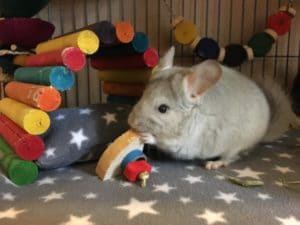
Chewing and gnawing is natural for chinchillas and is vital to help wear down their teeth.
Chinchillas love to chew on many household objects. Such as wooden beams, chair legs, and other pieces of furniture.
When your chinchilla is out of its cage you should keep a close eye on what they are chewing on and are consuming as some household objects are toxic and not suitable for chinchillas.
Here’s a small list of objects chinchillas love to chew on: shred coconut shells, seagrass, unbleached loofah, pumice stone, banana leaves, hay cubes, mineral lava, and cardboard used for packaging food products.
Chinchillas also love to gnaw on untreated softwood.
The best woods for your chinchilla include dogwood, grapevine and grape, willow-goat, weeping or pussy willow, apple, pear, red elm and elm, hawthorn, hazelnut, Quince, and Poplar.
Make sure it’s treated and clean if you decide to give your chinchillas wood.
Basic Chinchilla Food and Water Needs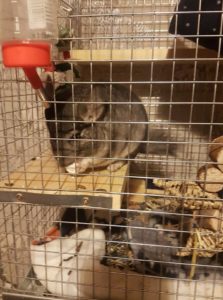
Chinchillas require constant access to clean drinking water. Use a drinking bottle to maintain water cleanliness and to prevent getting your chinchilla wet.
You should check the bottle regularly to make sure there’s nothing blocking the water from coming out. You should also replace the water daily.
High-quality hay is an essential part of a chinchillas diet and should make up to 75 percent of the meal.
You can use a hay rack for your chinchilla and make sure the hay is readily available. Always remember that grass and hay help to make the digestive system efficient.
As mentioned earlier, grass and hay also aid a chinchilla in the wearing down of teeth, keeping them at the right size and shape. Lack of these essential ingredients can lead to dental diseases.
Additionally, feed your chinchilla 1 – 2 tablespoons of grass-based pellets every day.
Chinchillas are known to feed for a long time, especially at night. They often sit on their large hind legs and use the front feet to hold food.
FAQs
Why is my chinchilla not eating?
Your chinchilla might refuse to feed due to dental issues brought about by overgrown teeth, a situation that is common to chinchillas. This situation may lead to dehydration and anorexia. Other conditions that might make a chinchilla refuse to eat include renal disease, cancer, degenerative and liver diseases.
Can I give my chinchilla carrots?
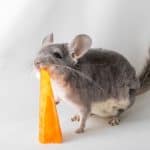
Yes, you can give your chinchilla carrots. Carrots are considered treats, thus should be given in moderation. Excessive consumption of carrots may be dangerous to your chinchilla.
My chinchilla is eating their droppings?
This might seem disgusting to you, but you should know that it is a natural process among chinchillas. It is vital for the health of the digestive system. Chinchillas eat their poop directly from its burn.
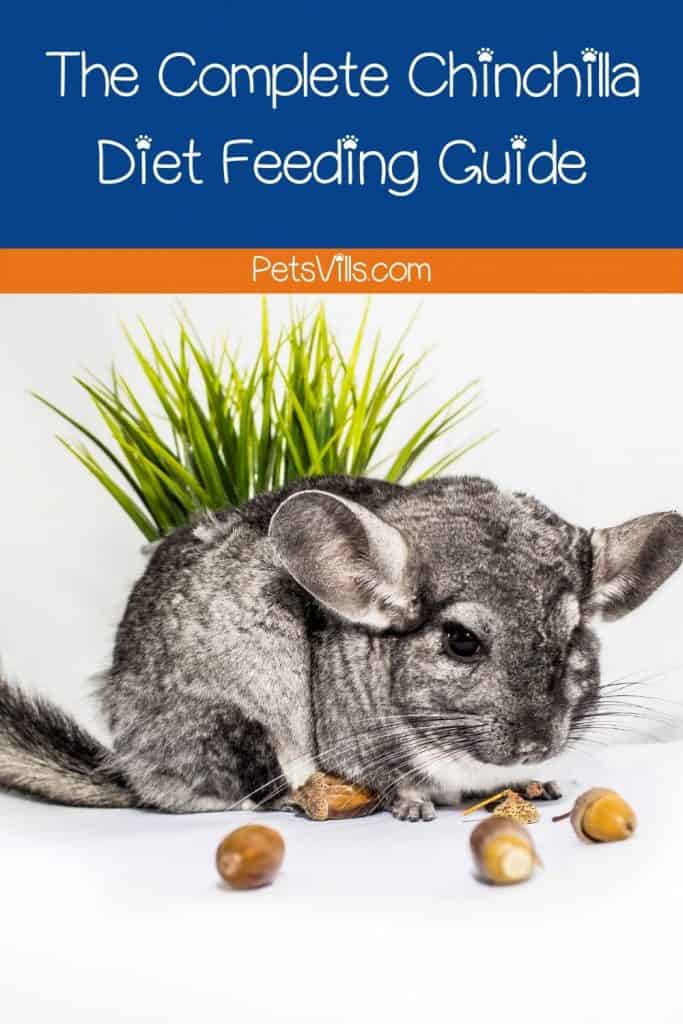
What kind of chinchillas diet do you follow? Share your thoughts below!
Alina Hartley is a small-town girl with a ginormous love of bearded dragons. It all started with Winchester, a baby bearded who was abandoned at the shelter by his former owners because of a birth defect that caused one front leg to be shorter than the other. Alina originally went to the shelter looking for a guinea pig, but one look at Winchester and it was love at first sight. From that day on, Alina has dedicated her life to learning everything she can about bearded dragons. She loves helping new beardie parents start their incredible journey with these magnificent reptiles.
Follow her on:
LINKEDIN
TWITTER.
Read her latest articles HERE
Learn more about her HERE.

